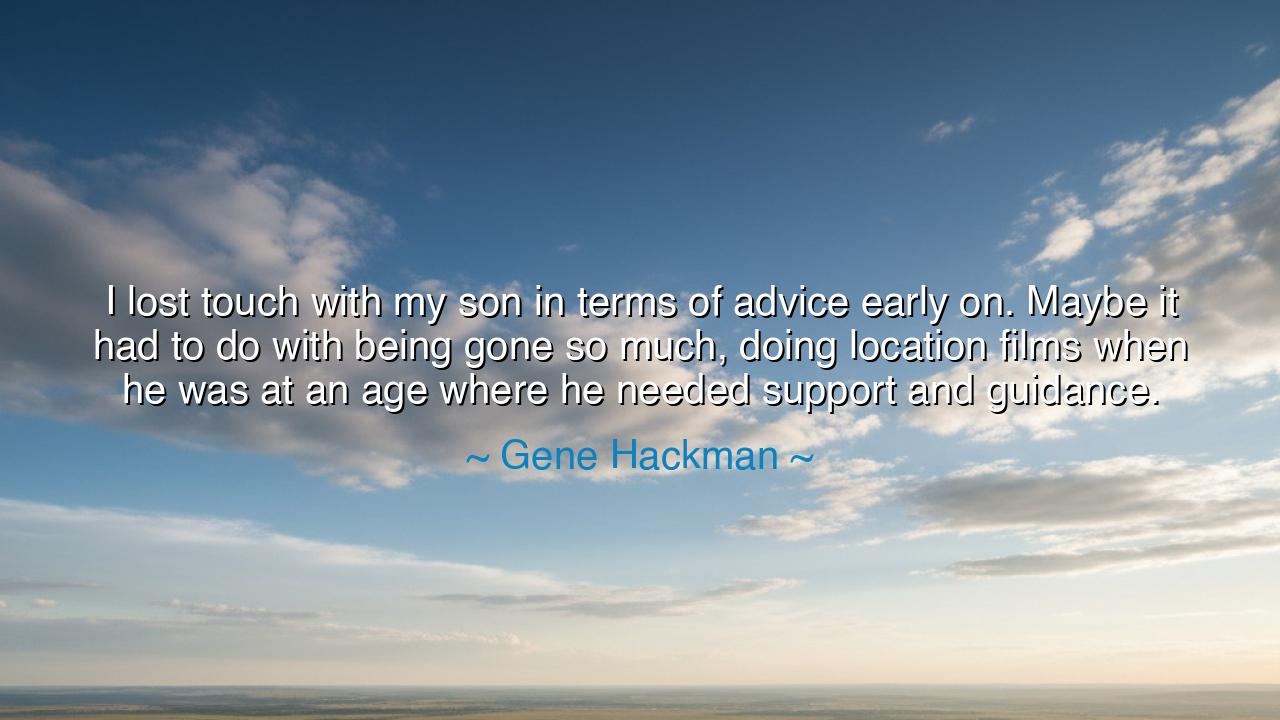
I lost touch with my son in terms of advice early on. Maybe it
I lost touch with my son in terms of advice early on. Maybe it had to do with being gone so much, doing location films when he was at an age where he needed support and guidance.






"I lost touch with my son in terms of advice early on. Maybe it had to do with being gone so much, doing location films when he was at an age where he needed support and guidance." – Gene Hackman
In the journey of life, there is a truth that echoes through the generations: time and attention are the most precious gifts we can offer to those we love, especially to our children. Gene Hackman, a man whose name is known to many as a master of his craft, speaks here with the weight of reflection and regret. To lose touch with one's child, especially at a time when they are in need of support and guidance, is a sorrow that no fame or success can erase. It is a lesson that transcends the world of film and art, offering wisdom to all who seek to balance the pursuits of ambition with the duties of parenthood.
The truth Hackman reveals is not unfamiliar. Fathers, in particular, often find themselves torn between the call of their careers and the needs of their families. The ancient Greeks, in their wisdom, spoke often of the balance between personal ambition and familial responsibility. Take, for example, the story of King Agamemnon, whose quest for glory and power led him to sacrifice his own daughter, Iphigenia, to the gods. His ambition, though rooted in the desires of kingship, led him to sever the bond of fatherhood, causing a tragedy that would ripple through the ages. In Hackman’s own story, though the sacrifice is not as dire, there lies a similar truth: absence and neglect, even in the pursuit of great achievements, can result in a disconnect that is difficult to repair.
Hackman’s regret is a reflection of a universal challenge faced by those who strive to succeed in the world. Success, in the form of professional triumph, often comes at the cost of personal relationships. Like the great warriors and scholars of old, many of us find ourselves so immersed in our missions—be they for the betterment of the self, the family, or the nation—that we forget the importance of nurturing the ones who need us most. Hackman, much like the heroes of the ancient epics, faced a dilemma between personal glory and familial duty. His decision to spend time away from his son, to pursue his career, led to the slow erosion of a bond that should have been built upon the foundation of shared moments and wisdom.
The story of Hackman offers a lesson that resonates deeply in the hearts of all who have known both great ambition and the love of a child. In ancient times, there were wise elders, such as Confucius, who taught the value of family above all else. He said, "The strength of a nation derives from the integrity of the home." Hackman’s own words echo this truth: the presence of a father is more valuable than the fruits of his labor. There is no greater influence than the steady hand of a parent, guiding their child through the turbulent seas of life. This truth does not diminish with time; it remains eternal.
Hackman’s reflection is not a plea for sympathy but a call to awareness. We are all, in one way or another, pulled between our duties—to our work, to our passions, and to our families. The question we must ask ourselves is not whether we can achieve success, but whether we are nurturing the connections that matter most. Hackman’s own struggle—between the demands of his profession and the needs of his son—is a reflection of the broader human experience. How many of us, in the pursuit of success, have overlooked the quiet calls for help from those we love? How many of us, in our absence, have left gaps in the hearts of those who needed us most?
The lesson here is clear: be present. In our ambition to forge a name for ourselves, let us not forget the names of those who call us father, mother, or friend. The bonds we build with those closest to us are the ones that define our true success. Time is fleeting, and the moments we share with our children are irreplaceable. Hackman’s regret serves as a reminder that real success is not measured by the accolades we earn, but by the relationships we nurture.
In practical terms, we must strive to balance our ambitions with the needs of those we love. Take the time, however fleeting it may seem, to listen, to guide, and to be present. Let us not fall into the trap of believing that success comes solely through achievement, for true success lies in the moments shared with loved ones, in the advice we give and the love we impart. Let us heed the wisdom of Hackman’s reflection and allow presence to be our most precious gift.






AAdministratorAdministrator
Welcome, honored guests. Please leave a comment, we will respond soon